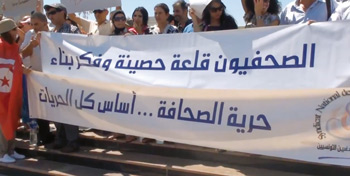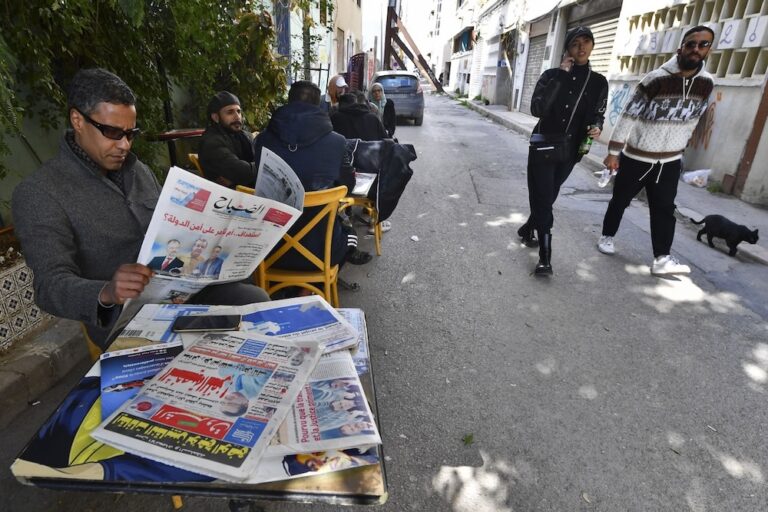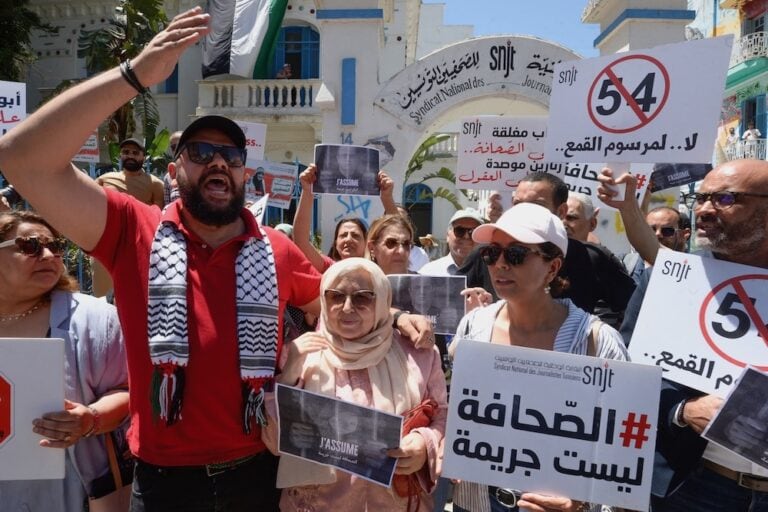IFEX Tunisia Monitoring Group protests government appointments at media outlets, as well as mounting attacks on journalists, writers and artists.
(IFEX-TMG) – 29 August 2012 – In the wake of recent government appointments to heads of prominent media outlets, as well as attacks on journalists, writers and artists, the International Freedom of Expression Exchange Tunisia Monitoring Group (IFEX-TMG), a coalition of 21 IFEX members, expresses serious concern over what has been a wave of setbacks for freedom of expression in Tunisia.
The IFEX-TMG strongly condemns the increasing use of violence and threats against journalists, artists and writers by police and ultra-conservative groups, and the government’s failure to put an end to the impunity of those carrying out these attacks. Furthermore, members of the media are in the midst of an ongoing battle to safeguard the freedoms gained during the democratic transition period, after the revolution.
Lack of transparency and consultation
On 22 August 2012, the Tunisian government appointed Imane Bahroun as the head of National Television and Lotfi Touati, a former security officer, as director of media group Dar Assabah, the company which publishes two influential daily newspapers and a weekly magazine.
The government had relieved former Dar Assabah director, Kamel Sammari, of his duties despite plans by the company’s board to discuss the issue on 15 September 2012. The move was strongly condemned by journalists and public figures, who protested outside the building for several days and ran blank front pages in Assabbah and Le Temps in solidarity. The National Syndicate for Tunisian Journalists (SNJT) has strongly condemned the removal and has since called for a strike on 15 September 2012 to express its concerns about the erosion of media freedoms.
Both of these new appointments were made without consultation with relevant media bodies such as the SNJT, who along with several political parties, rejected the decision as lacking transparency. This is the second time the government has appointed directors of public media unilaterally and without consultation, after appointments were made to public service media in January 2012. These were later rescinded after a public outcry.
The IFEX-TMG considers the appointments a setback on promises made by the government to act transparently and to safeguard media freedom. “Instead of introducing fair media laws after proper consultation, the government has created a legislative dead zone, and given itself sole freedom to exploit it,” said Rohan Jayasekera of Index on Censorship, a member of the IFEX-TMG.
Arrests and intimidation in the workplace
On 25 August 2012, the Court of Appeal in Tunis issued an order to arrest Sami Fehri, the director of Attounisia TV station on charges of financial impropriety at a production company he co-owned that was contracted by the national TV station prior to the revolution. The order for his arrest came two days after he was told the government was annoyed by his satirical programme the Political Logic, in which he criticised the government and Ennahda party leaders including Rachid Al-Ghannouchi. Fehri declared before his arrest warrant that Lutfi Zaitoun, the Prime Minister’s media advisor, called him and asked him to suspend the programme. If convicted, he faces up to ten years in prison.
According to Fehri’s lawyer, the arrest violated the Tunisian Penal Code and the accused was not given the right to defend himself nor to be informed about the charges against him. “The lawyer’s explanation shows the case is purely political,” said the Tunis Centre for Freedom of Press.
Other journalists have been pressured at work. On 21 August 2012, Boutheina Gouia, who presents the News and Rumour programme on national radio, was informed by her boss that she was suspended for hosting SNJT officials whom she invited to discuss the latest appointment of managers to the national TV and Assabah newspaper.
The guests on the programme criticised the government’s approach to dealing with the public media. “There has been a change in the attitude of employees with the national radio, it looks like a policy of intimidation has succeeded,” Gouia told the IFEX-TMG.
As part of the pattern of intimidation, previously on 6 July 2012, Nadia Al-Hadawi, a journalist at the national radio, was prevented from entering the building where she was supposed to present her morning programme with well-known writer Naziha Rjiba, a critic of the government.
The IFEX-TMG says the suspension of Gouia appears to be an arbitrary act designed to punish her for exercising her right to freedom of expression, and an attempt to deter others from criticising government actions.
Physical and verbal attacks by police and Salafist groups
The IFEX-TMG is also alarmed at a number of recent physical and verbal attacks on journalists that have taken place in Tunis and other cities, coming at the hands of police, union members and ultra-conservative religious groups (also referred to as Salafists.) On 6 August 2012, Monji Akasha, a journalist with Sfax Radio, was attacked by some of the Housing and Planning Office’s union members while covering strikes in the Sfax area.
Also on 6 August, journalist Sihem al-Mohammedi and photographer Abdul Hamid Al-Omary from Al-Hiwar Attounisi TV station, journalist Nai’ma Al-Sharmeeti from Arabiske TV station, and journalist Seif Eddin Al-Ameri from Akhir Khabar online news site were physically attacked by police on Avenue Bourguiba while covering the violent dispersal of protestors by police officers. Al-Omary suffered injuries to his legs after being badly beaten by the police.
Around the same time, on 5 August, Tunisian blogger Lina ben Mhenni was reportedly deliberately targeted and beaten by police during a demonstration on Avenue Bourguiba.
On 14 August 2012, ultra-conservative Islamists attacked the comedian Lutfi Al-Abdali and prevented him from presenting his show in the town of Manzil Bourguiba after they claimed he was offensive to Islam.
On 23 August 2012, a group of Salafist men physically attacked and severely beat prominent poet Sghaier Ouled Ahmed after he appeared on a programme on Attounisia TV in which he criticised Ennahda and its leaders. Afterwards, Ouled Ahmed said, “No officers or officials will be saved from the bombs of my poetry and prose if they continue to turn a blind eye to such attacks.”
On 24 August 2012, poet Mohammed Al-Hadi Al-Waslati was attacked by a group of Salafist men in Tunis. He was later taken to hospital and is still in a critical condition.
In an interview broadcast on 25 August 2012 on Express FM Radio, the Minister of Culture, Mehdi Mabrouk, stated that the phenomenon of Salafist attacks has to be confronted but claimed the situation was under control. This contradicts the reality that attacks are reportedly on the increase.
The IFEX-TMG calls on the authorities, including the Ministry of Culture, to investigate these attacks and bring the perpetrators to justice in order to create a safe environment in which journalists, artists and writers can work freely, without threat or censorship.
The IFEX-TMG once again calls on the government to implement Decree 2011-115 (also known as the new Press Code), especially article 14, which guarantees the protection of journalists from harassment and attacks and criminalises any act of violence against them.
“We think that the government is buying time with too many promises and no actions. We are worried about freedom of the press in Tunisia. Many factors indicate that that there is a setback regarding freedom of expression. Attacks on writers, journalists and artists continue without any punishment or action. This situation takes us back to 1988 when Ben Ali had a U-turn on freedom of expression. We must fight against that,” says SNJT Chair Najiba Hamrouni.
The IFEX-TMG states that by implementing the media laws which came into force in November 2011, better safeguards would be put in place to protect freedom of expression. It therefore urges the government to implement Decree 2011-115 and Decree 2011-116, which laid the groundwork for a newly independent broadcast media with the creation of the Independent High Authority for Audiovisual Communications (HAICA), which will have the power to appoint directors of the public media.



